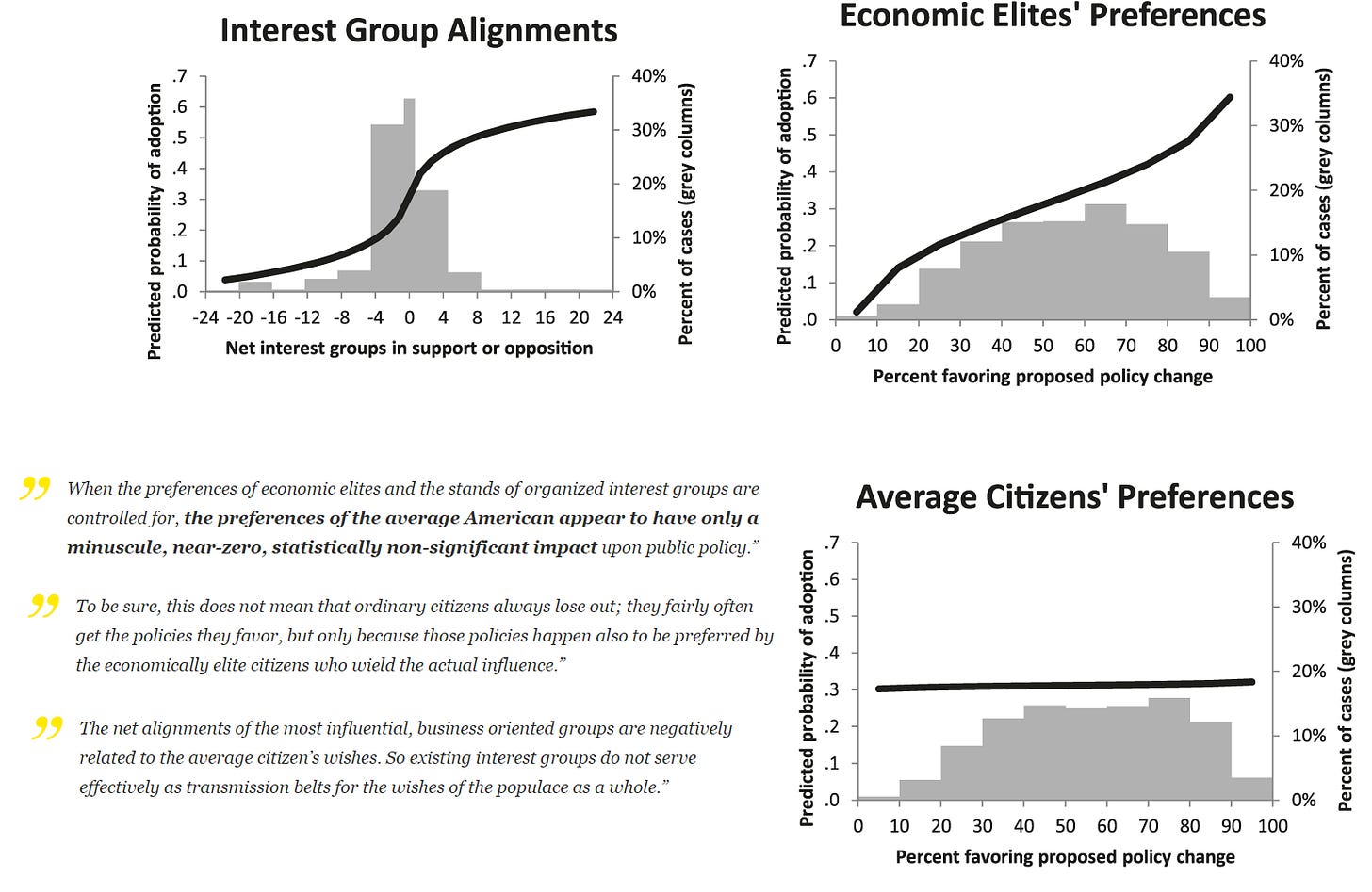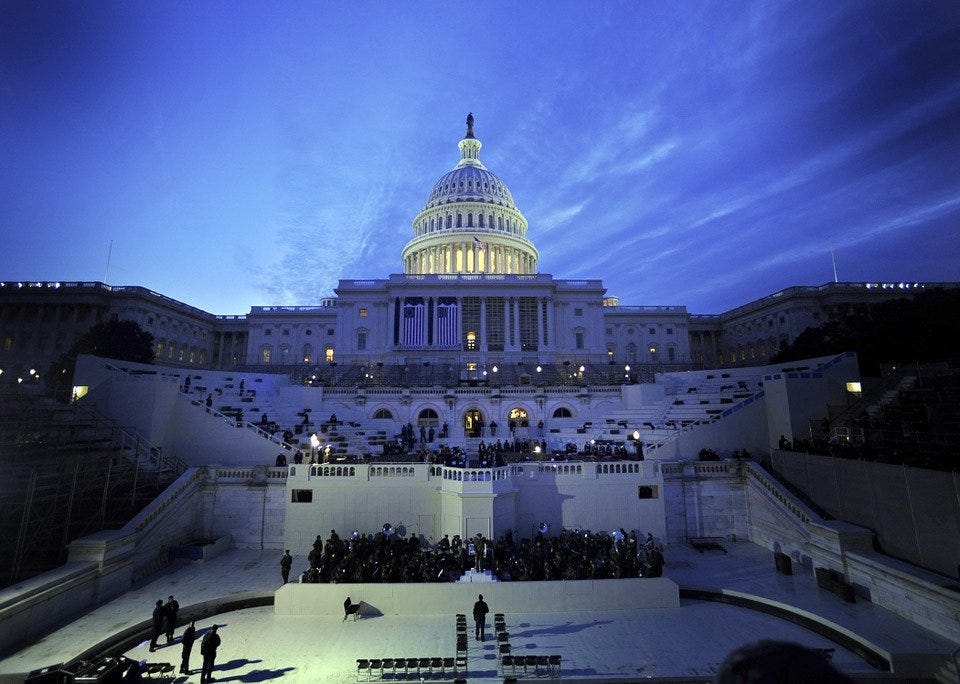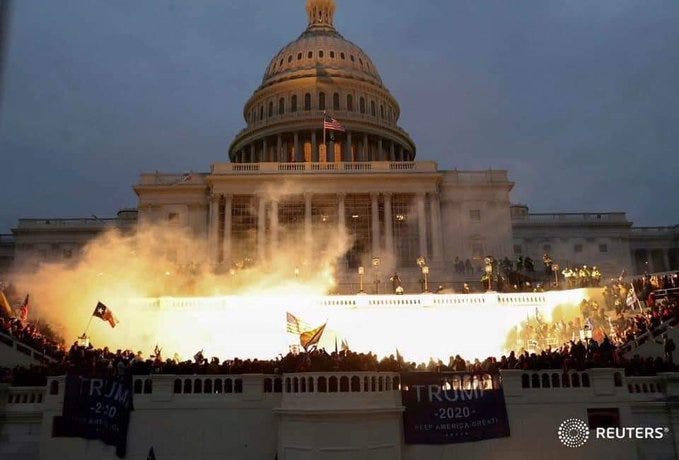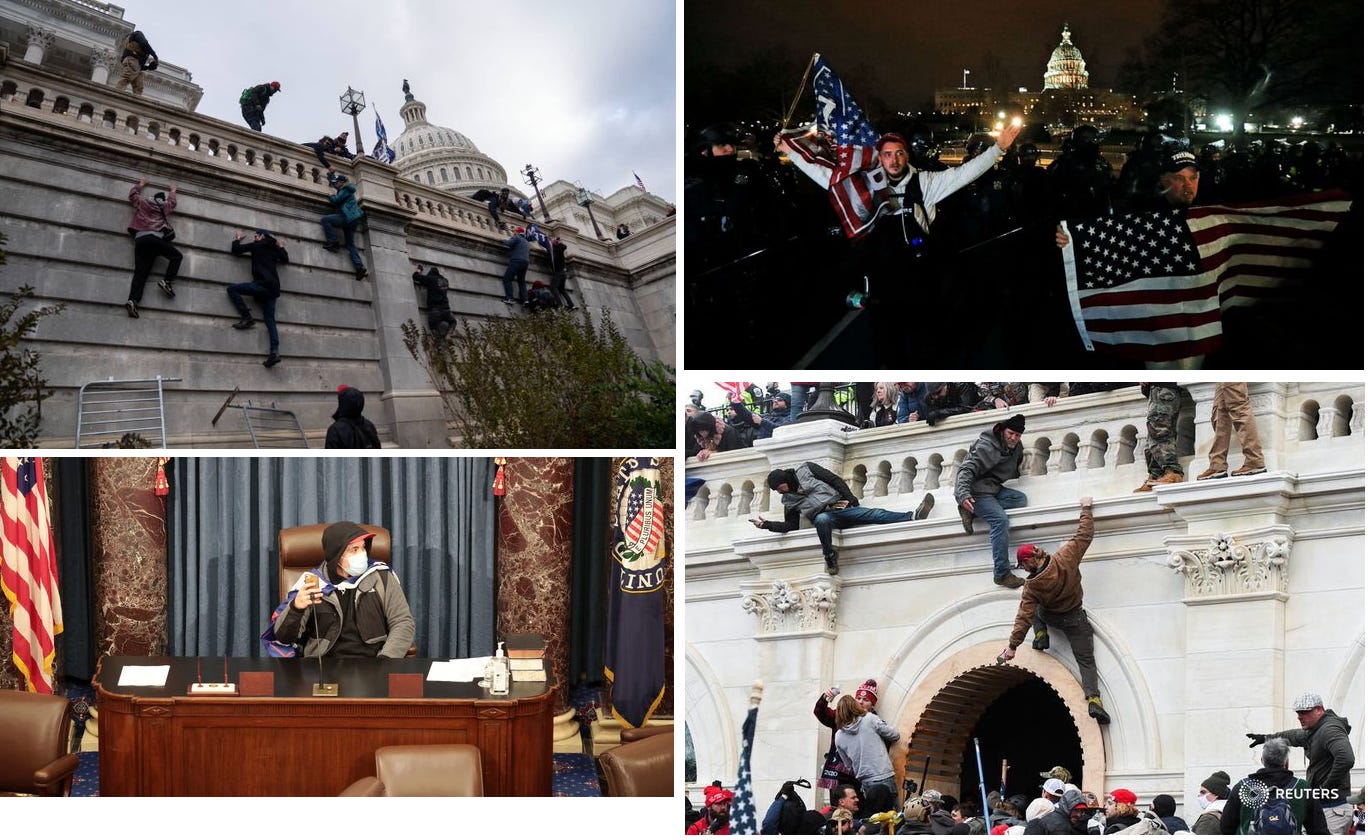Insightful newsletter of Drishtikone: Issue #219 - Rule of the Tweeds
Democratic Republic should be people's rule. But large powerful groups created a system where candidates are chosen, backed by elite and people are allowed to elect one of the chosen puppets!
Image by David Mark from Pixabay
“When plunder becomes a way of life for a group of men in a society, over the course of time they create for themselves a legal system that authorizes it and a moral code that glorifies it.” ― Frédéric Bastiat
“Well, Doctor, what have we got – a Republic or a Monarchy?” Mrs. Powel of Philadelphia asked Benjamin Franklin as he left the Independence Hall after the Second draft of the US Constitution.
“A Republic, if you can keep it”, Ben Franklin replied.
A republic is a government with representatives of the public. A state where the supreme power is held by the people and their elected representatives.
Democracy was a great idea that was sabotaged from the very beginning by those who usurped power in the name of the people they represented. In the US, people have only been able to choose between the candidates nominated for them by the Tweeds. For they decide who will do their bidding as they get the support from the powerful and moneyed to wield power and dictate the rulers.
The US may not have a monarchy. Yet. But it has an oligarchy that masquerades as democracy. The current troubles in the polity and the attack on the Capitol may look bizarre and bad and all the rest of it. But it is what happens when people are constantly lied to and someone who uses the simple tool of articulating their voice to run his own agendas - nefarious or otherwise - comes along. One day someone with money and the inclination, whatever his or her leanings, may want to beat the Tweeds.
And suddenly a carefully manicured democracy comes down undone.
The Jan 6th attack on the Capitol could not have been possible by random trollers. The capitulation of one of the most guarded buildings in the world is a sign of a greater malaise. Normal protesters, however angry, cannot jump over a fence and get into the Congress to impersonate the speaker. It takes a whole new level of anarchy to unleash such a force.
Test of democracy
US Capitol - the seat of American Congress was the scene of an unprecedented riot yesterday - January 6th. Four people died, including one young woman from the bullet of a law enforcement officer.
In 1975, in a study backed by the Trilateral Commission, Harvard political scientist Samuel Huntington and his co-researchers produced a survey of democracy’s health in the United States, Europe, and Asia (Source).
Trilateral Commission is a non-governmental, nonpartisan discussion group founded by David Rockefeller in July 1973 to foster closer cooperation between Japan, Western Europe, and North America.
Their study results (Crisis of Democracy) were interesting.
They found that faith in government had nosedived, political parties were fracturing, and efforts to pacify voters through more public spending had sent both inflation rates and deficits soaring. Too many people—Huntington’s list included “blacks, Indians, Chicanos, white ethnic groups, students, and women”—were demanding too much from politics, rendering the entire system ungovernable. (Source)
Many in the past few decades have conjectured about the erosion of basic democratic principles in a society.
Narratives as in Madeleine Albright’s Fascism: A Warning, Steven Levitsky and Daniel Ziblatt’s How Democracies Die, Cambridge political theorist David Runciman’s How Democracy Ends and conservative pundit Jonah Goldberg’s Suicide of the West are becoming common-place and trendy.
The only issue is that most of the writers blame the other side. In the US, the so-called left-liberal (they are neither left nor liberal) blame the right. The right blames the left.
And, the twain shalt not meet in any universe!
Plato who was incidentally the greatest critic of democracy, along with Socrates (discussed in Plato’s book “Republic”), called democracy “young man’s politics”. And just like the young men of that time, democracy shared similar characteristics – full of vanity, fickle, often drunk, prone to violence, easily led, and foolish. So, Plato warned that if that is what you want your politics to be like – then go for Democracy. These earliest critics of democracy called it a Rule by the ignorant, poor, and the young. (Source)
Well, as it turned out most of the leaders are neither young nor poor and not even uneducated.
It is clear that there is a vast chasm between the Electorate and the Elected. Those who govern and those who vote.
The mechanism which makes the hoisting of the elected on the other side of the chasm happen despite the distance is propaganda.
That is relentless. And disingenuous.
For example, when Noam Chomsky gives out such unequivocal wisdom on how the game between the elected and the electorate should always have the elected be answerable, he wants to only consider one option - that the one who is the anarchist is the left ‘revolutionary’ and therefore having every right in the world to do what he pleases.
“That is what I have always understood to be the essence of anarchism: the conviction that the burden of proof has to be placed on authority, and that it should be dismantled if that burden cannot be met.” ― Noam Chomsky
The other option is not even thinkable for him. Nor admissable.
Anarchy is a legitimate option for one of his own tribe. Not of any other. For in the minds of those who construct the narratives in a democracy, the right to voice and anarchy is always reserved for those on their side of the aisle.
Violence, any violence, is reprehensible. Specifically, one that seeks to take over the highest institutions - like the Capitol - by force!
But the real issues that manifested the violence - such bizarre and brazen display of total disregard for personal and public safety - has to have a strong basis. Specifically in a democracy.
Is the chasm too deep and too damn wide that the voices can no longer get through without one side jumping over to the other and holding the elected by the scruff of their neck?
There will be and have been many Chomskian style arguments and discourses. None of them will want to look at the nature, depth, and impossibility of the chasm. All will look at what happened yesterday in terms of blaming and having that “I told you so” aha-moments and high-fives or smarting but seething apologies.
The chasm won’t have any chance of becoming any better. It will only widen.
Watch this one sane take on what happened.


How did this chasm and different standards even emerge? How did the voice from the electorate stop to make its way through the chasm to the elected?
The Tweeds!
The Chasm and the representative-ness of the US democracy
William Magear Tweed also known as Boss Tweed was a very influential politician in the second half of the 1800s. He was the one who called the shots at Tammany Hall. Now, in democracies, which are touted as “representative” and are anything but, certain groups/organizations act as the funnel for political influence in political offices. These groups have access and support to some powerful - often rich and/or high in number - supporters who promise their backing. In return they get patronage.
These groups (and their bosses) have to ensure that on the day of elections they can get the votes needed for their candidates - who will, in turn, deliver on the promises made to the ‘support groups’.
Such influential groups are called “political machines” in political parlance.
Tammany Hall, (also known as the Society of St. Tammany, the Sons of St. Tammany, or the Columbian Order) was one powerful political group in New York City founded in 1786. It was a political machine within the Democratic Party.
Now, William, or rather Boss Tweed had a unique vision of democracy. It was explained by him thus:
“I don’t care who does the electing, as long as I get to do the nominating.” (Source)
So the game was fixed.
Someone nominates the candidates for us. We vote on those selected few.
And, in the US, it is even worse. Because even when we have voted, the electoral college then takes our votes and throws all of them in someone’s lap based on who gets most votes in a state. It is called the “Winner takes all” system.
So the funnel works at both ends. One, to select the candidates who will do the bidding of certain groups. And, two, who actually get the highest state vote irrespective of what people in different constituencies may have voted for! (Please read - Issue #186 - US Democracy? What Democracy?)
Harvard law professor Lawrence Lessig calls this phenomenon (at least the front-end funnel) - “Tweedism.”
The people do retain that ultimate influence, Lessig allowed. We can go to the polls on Election Day and cast a vote with the same weight as everyone else’s. But he argued that the candidates over whom voters exercise their influence emerge from a system biased toward the moneyed few. Only after the neo-Tweeds have done the nominating, in other words, can the people do the electing.(Source)
We may recall that in Democratic primaries leading up to the recent elections, the rules were altered mid-way to keep Tulsi Gabbard out of the debates. (Source)
Now, Tweeds amongst the American businesses and elites is the best-case scenario. Quite bad for the populace, but still the best-case scenario for the country of the possible situations. Factor in the money-hungry politicians who want to be elected at any cost and throw in foreign agencies with money waiting to buy them out and you suddenly have a country’s entire Congress on a huge fire sale!
US democracy is a manicured democracy where the masses are assumed to be idiots. It is representative sure. Not of the people. But power groups. The political machines. Groups and organizations that wield power, money, and influence.
Larry explains the whole process in his TED talk brilliantly.
Now, Martin Gilens and Benjamin Page, from Princeton and Northwestern Universities wanted to look into the most fundamental question - “Who rules America?” So they did one of the largest ever study of this nature “using a unique data set that includes measures of the key variables for 1,779 policy issues.” (Source) They wanted to check as to which groups or set of actors have the biggest influence over the public policy in the US. Was it the average citizens; economic elites; and organized interest groups, mass-based or business-oriented?
There were different political theories that had informed this question in their own way.
While this body of research is rich and variegated, it can loosely be divided into four families of theories: Majoritarian Electoral Democracy, Economic-Elite Domination, and two types of interest-group pluralism—Majoritarian Pluralism, in which the interests of all citizens are more or less equally represented, and Biased Pluralism, in which corporations, business associations, and professional groups predominate. Each of these perspectives makes different predictions about the independent influence upon U.S. policy making of four sets of actors: the Average Citizen or “median voter,” Economic Elites, and Mass-based or Business-oriented Interest Groups or industries.(Source)
The results that they got from this study were very instructive about the state of US democracy!

This is how they put it.
Clearly, when one holds constant net interest-group alignments and the preferences of affluent Americans, it makes very little difference what the general public thinks. The probability of policy change is nearly the same (around 0.3) whether a tiny minority or a large majority of average citizens favor a proposed policy change (refer to the top panel of figure 1). By contrast—again with other actors held constant—a proposed policy change with low support among economically-elite Americans (one out of five in favor) is adopted only about 18 percent of the time, while a proposed change with high support (four out of five in favor) is adopted about 45 percent of the time. Similarly, when support for policy change is low among interest groups (with five groups strongly opposed and none in favor) the probability of that policy change occurring is only .16, but the probability rises to .47 when interest groups are strongly favorable (refer to the bottom two panels of figure 1). (Source)
No wonder the electorate doesn’t feel represented anymore.
Does that tell us why some people would risk their lives and storm the Capitol for a man, as uncouth and even abusive as he is, who may have struck a chord with many? So many back him up, despite his behavioral issues only because he seems to not go along the Gilens and Page graphs!
Is US democracy right now at a stage where the common men and women are ready to “storm the Bastille?”
Calling them words - cowards, terrorists, anarchists, right-wing, fringe-elements - will not solve the problem. It will accentuate it!
market corner: 10 quick bytes
India’s GDP may shrink 7.7% this fiscal year, says govt; projection in line with street estimates - more
Domestic steel prices have touched a record high, adding to cost pressures on the automobile and consumer durable makers at a time when demand is starting to rebound from the impact of the pandemic - more
Advertising volumes of News genre rose by 5% in 2020 while GEC registered a 3% decline: TAM AdEx - more
Bitcoin surges to $40,000; doubles in less than a month - more
Road ministry to spend over Rs 1,200 crore for wildlife passes on highways - more
Payment banks could fast-track our financial inclusion journey - more
CBDT issues protocols in case of a treaty-exchanged data breach - more
At 20%, small finance banks have the highest return on advances - more
12 new unicorns, IPO pipeline to strengthen in 2021: Nasscom - more
Indian domestic passenger traffic was 49.6% lower in November: IATA - more
nota bene
JIT Arrests: With its Financial Action Task Force (FATF) review around the corner, Pakistan on Thursday acknowledged the presence of Jaish-e-Mohammad chief – Maulana Masood Azhar on its territory and sought an arrest warrant against him, top officials in the government said. (Source)
Bomber Sues Govt for Bad Treatment: Boston Marathon bomber Dzhokhar Tsarnaev has sued the federal government for $250,000 over his treatment at the Colorado prison where he is serving a life sentence. Tsarnaev, 26, calls his treatment in the handwritten suit filed Monday “unlawful, unreasonable and discriminatory.” He cites the confiscation of a white baseball cap and bandana that he bought at the prison commissary and a limit of three showers per week (Source)
India’s Mysterious Monolith: After 'mysterious' monoliths were spotted in different parts of the world, India also marked its first appearance of such a monolith in a park in Ahmedabad. The mysterious monolith evoked a lot of intrigue after its appearance at the Symphony Forest Park on the SG Highway on Thursday (December 31). It is similar in look to other monoliths, with shiny metal sheets that form the three-sided structure. (Source)
Neanderthal gene for COVID: People who carry a version of a gene inherited from Neanderthals are at lower risk of serious illness, hospitalization, and death from Covid-19, a new study has found. The gene, known as OAS1, was incorporated into the human genome after our ancestors mated with the now-extinct human relative around 60,000 years ago. The OAS1 gene controls a protein of the same name, which is involved in the body's response to viruses. The version inherited from Neanderthals is less common in society, but offers increased protection against the coronavirus, researchers say. (Source)
video corner:
What we are seeing is a competition of outrage and emotion! Very rarely a nuanced and intelligent discussions. Here is a brilliant take on the current world given some extremely astute observations! Please do watch this if you have to watch anything this entire month!
Today’s ONLINE PAPER: Check out today’s “The Drishtikone Daily” edition. - THE DRISHTIKONE DAILY
TOOLS WE USE (our secret recipe): Here are some tools we use to streamline our work and do things in a lean and agile manner.
Evernote: One-stop shop for all note-taking and content clipping - this tool has notes, articles (~10,000) saved since 2005 which go into our research (have used their premium plan - very powerful!) // Fiverr: Get everything done by professionals for much less money. The most important marketplace for great talent! // Grammarly: your personal grammar checking tool (indispensable for writers)// Ferns n Petals: Send cakes, flowers, gifts, rakhis in India (tried and tested for 5 years!) // Sling TV: throw out the expensive cable and dish TV and get the same channels for less // Bluehost (US): Cheap and powerful website hosting (start a site for just $3.95/month - for India use this link -> Bluehost-India to start a site for $199/month) // Headliner App: Create amazing videos from the podcast/audio files with FB/Twitter integration (get 2 weeks free) - we use it for our podcasts
[These are referral links - which may provide us with some consideration at no cost to the user]
SUPPORT DRISHTIKONE: If you consider our work important and enriching and would like to contribute to our expenses, please click on the button below to go to the page to send in your contribution. You can select the currency (for example, INR or USD, etc) and the amount you would like to contribute. Contribute to Drishtikone
If you like this post - please share it with someone who will appreciate the information shared in this edition
If you like our newsletter, please share it with your friends and family







